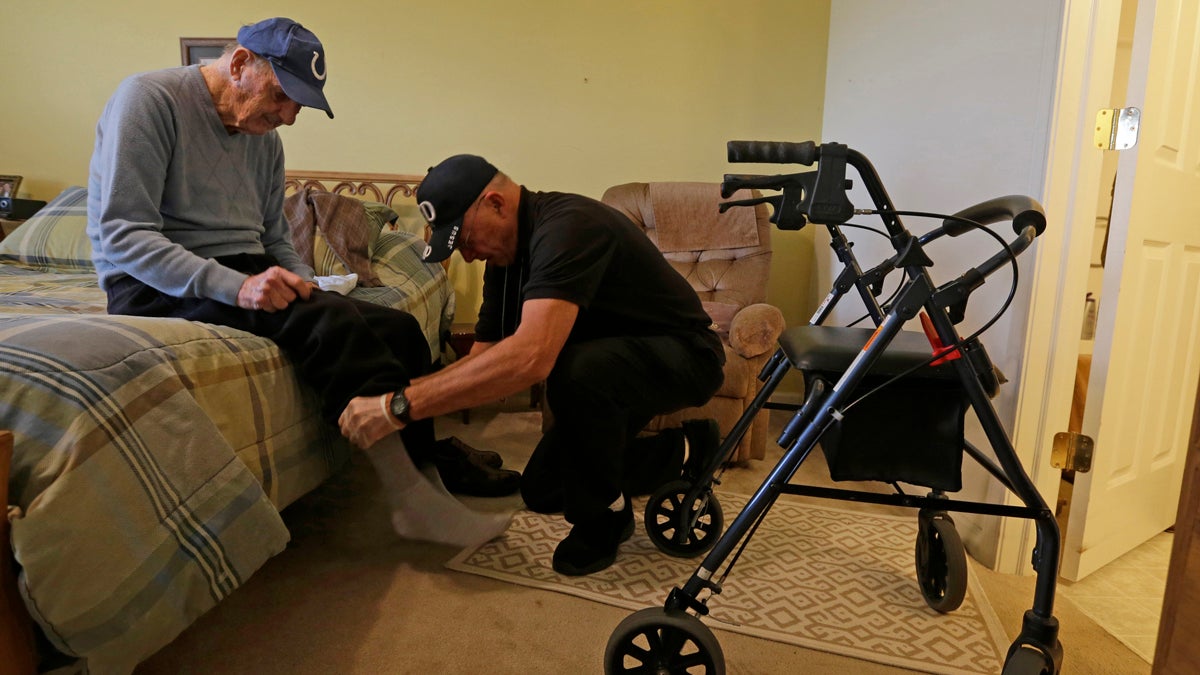Caring for caregivers when their lives feel ‘a bit like war’
Listen
(AP Photo/Darron Cummings)
A look at the challenges of caregiving and the ways in which we can help those providing care for a loved one.
Every year, 65 million Americans provide care for an ill spouse, a parent, a child or a friend. They spend about 20 hours a week doing this – and they’re unpaid. They are a huge, but hidden, part of the healthcare sector.
Quoting a number – 65 million Americans – doesn’t tell you anything about what it’s like to actually be a caregiver and those doing this work often seem to be tight-lipped about their experiences.
“Our lives felt a little bit like war,” says mathematician Marion Deutsche Cohen reflecting on the period in her life when she cared for her husband who had MS. She didn’t think others could understand her experience as a “well spouse,” somebody who cares for their sick partner. “Well Spouses often talk about other people who are not well spouses as ‘civilians’ jokingly, but it does kind of feel that way,” she said.
At one point, she felt that her existence came down to three words, “nights, lifting and toilet.”
“Nights means waking up, it would end up being every 15 minutes or so from his various needs, lifting – I was lifting him from the wheelchair to the toilet and toilet, well, use your imagination,” said Cohen.
Deutsche Cohen’s husband Jeff Cohen, a physicist, was in his 30s when he was diagnosed with MS. His condition started to deteriorate rapidly when he was in his 40s. Two of their four children were still small, and the challenges started to wear Marion down.
“I broke my ankle, probably because I was tired. The day after, our home health aide called and said he couldn’t show up that day, so there I was with a broken ankle and Jeff just stayed in bed that day.”
Deutsche Cohen has written two books about her experience – one called “Dirty Details” about home caregiving, and “Still the End” which describes the years her husband spent in a nursing home and his death. She says writing the books has helped her process a rollercoaster of emotions that she experienced as a caregiver.
Caregivers have to learn to accept their feelings, and come to terms with them, says Yosaif August, a life coach who has written a book called “Coaching for Caregivers.”
“Wherever you are, accept that, honor that, whatever you’re feeling about it, honor that.” August says burnout is a major issue because people neglect their own health. That happened to him when he cared for his father. “I got shingles. I was walking in the hallway of my father’s hospice and I asked the doctor there to take a look at my back,” he recalled. The doctor told him he had shingles. “I did the eulogy for my dad bent over in pain,” said August.
Here are some key points from our conversation with August:
What are some of the challenges caregivers face?
There is not a lot of permission or acceptance for admitting what a tough time you are having and admitting the fact that you can’t complete a task you are working on because your loved one needs something right now. And then something else, and then something else. Unless people reach out for support, they stuff those feelings down, and they feel shame, they think ‘I shouldn’t be feeling resentful, or upset.’
How do you start to take care of yourself when you’re a caregiver?
Find something relaxing that you can do today that takes five minutes, maybe ten. Maybe then you can take a bath. Use care sites online. They are free, and you don’t have to call and email people about your loved one’s condition. You can just put out your message, and there is a calendar. You can add tasks, such as ‘I need my lawn mowed, I need a meal delivered.’ Start to let people in to share the care. And don’t be afraid to set boundaries. One day my friend Betsy called me to tell me that my friend Mel was fading quickly, they live in California. I booked a flight, and later that day she emailed me to say ‘please don’t come.’ She said that Mel couldn’t handle company, and she was too tired to deal with guests. So, she was setting her boundaries, letting me know what she did and did not want. Those of us who are friends of caregivers, we need to honor that.
What can we do to support a caregiver?
Ask them what you can do for them today or this week. Don’t say ‘call me when you need help,’ that is useless. Approach them, ask them to identify 20 small things that they need to get done over the course of the next month. Get them on the calendar and get people who are willing to help out to sign up for them.
Caregiving can be a gift
When I cared for my father, I had some of the greatest experiences of intimacy and talks about things that matter, that’s really big. And when you look back at that time, you can say to yourself, ‘I was able to walk my values, I was able to show up.’
WHYY is your source for fact-based, in-depth journalism and information. As a nonprofit organization, we rely on financial support from readers like you. Please give today.




